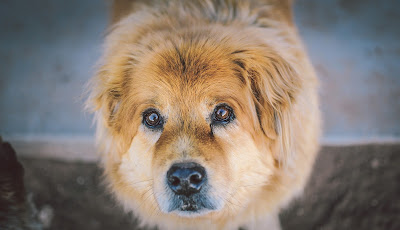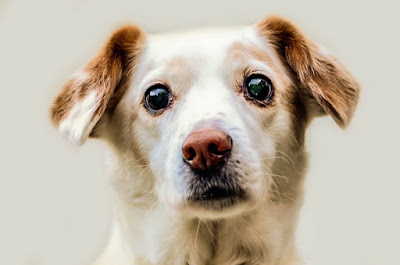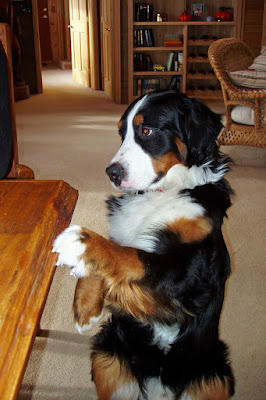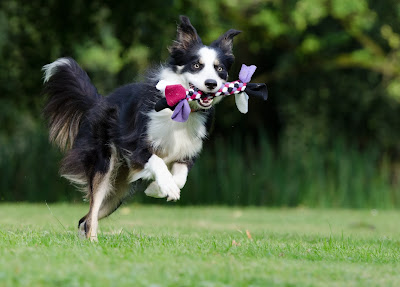Keeping your dog from becoming overweight has farther-reaching benefits than appears at the surface. It touches on your dog's long-term health, general quality of life (moods, irritability, and activity), and also influences your dog's lifespan. Unhealthy weight can slash off 1-3 years from the life of your beloved pet, showed a study that tracked selected dogs over a period of 14 years. Obesity also has a psychological bearing on your dog which further impacts its physical health.
So, what exactly are the benefits of keeping your dog's weight in check?
 |
| An Overweight Dog Is at Risk of Disease |
So, what exactly are the benefits of keeping your dog's weight in check?
Healthy Weight Makes for a Happy Dog
For starters, a dog with healthy weight is a happy dog. Healthy weight dogs are more jovial, alert and active which greatly improves their quality of life. This winds into a loop because the lean, happy and active dogs will keep off the weight while the overweight ones will end up being couch potatoes that just pile fat on and do very little.
Psychological Implications of obese dogs.
There is a psychological side to all the weight noise being made. Unfortunately, not many people know this and even those that may have a clue do not realize how important it is. You see activity in dogs, just like in humans, leads to a certain rewarding feeling. Remember how good it feels just after accomplishing something? Well, dogs have that too. Playing with a dog, letting it fetch the ball, chewing rope or whatever toy, gives it a sense of accomplishment. When this happens, ‘happy’ hormones are released into the blood stream which affect the dog’s health mentally and physically in more ways than one, putting the immune system of your dog in optimal working condition.
Do not let your dog’s life be one dull episode of eating, pooping and sleeping- that is not living. Unfortunately for your dog, there is nothing it can do. You are in charge so take control of your dog’s weight.
 |
| Keeping Your Dog Lean Will Improve Its Quality of Life |
Lean Weight Encourages Long Life in Dogs
If you love your dog, I am sure you want to be with it for as long as possible. One way to ensure your dog has a long happy life is by watching its weight. Dogs with healthy weight live longer than their obese couch-potato counterparts by 1 – 3 years. That’s a lot of years for a dog. The lean active dogs delay or completely keep off the onset of age-related crippling arthritis and other life-threatening diseases.
As already mentioned, lean weight in dogs encourages activity. Activity keeps the blood running, the heart exercised, the lungs stretched and the muscles flexed.
Dog Obesity and its Impact on Your Pet’s Health
Without even going into exact dog diseases caused or encouraged by obesity, we can address the relationship between the mechanical health of your dog and its weight. Let’s look, for example, at the lungs. The relationship is simple:
Overweight dogs are inactive, inactive dogs rarely take in deep breaths which means they rarely work their lungs and that can impact the respiratory system negatively in the long run.
You see all mammals have times when their blood races, hearts beat fast and they breathe rapidly. This is essential to the animal’s long-term health. In the wild, mammals get this rush when they pursue prey, escape from predators, fight or just play.
 |
| Happy Lean Agile Dog |
Let’s now look at your dog. It is not chasing any prey, not escaping from any predators, not fighting, and not playing. (Well, I am not saying to make your dog fight, I am just making a point). Its lungs are not getting a chance or a reason to stretch and accommodate deep breaths, the blood vessels never get rushing blood, and the heart muscles never get to pump harder than they do when your dog is sleeping. The brain has nothing to figure out beyond ‘poop time’ and ‘bowl time’.
What is essentially happening is that your dog’s system is not being utilized and what happens when something is not used? Buildings soon become dilapidated, machines become rusty and your dog’s body will become old sooner than it should. It has no reason to function. I have seen dogs that only get excited when they see food. At least they get lively when they see food, you might think. But experience has shown me that even food ceases to excite the obese dog. All zest for life is gone.
Minding your Dog’s Weight may just alert you to an underlying disease.
Checking your dog’s weight may just mean the difference between life and death in weeks or months. Take for example Sally.
Sally was a happy active Rottweiler who started putting on weight. The family thought it was normal because the gain was gradual. But even though they didn’t much of it, they decided to control Sally’s weight. Soon, Sally was on a controlled diet with counted calories and having playful exercises. After a month of no change, the family was pulled into an investigation with the vets which unveiled an unfolding case of hypothyroidism.
There are many dogs like Sally out there but not as many owners as her’s. You see there are a lot of diseases which cause obesity in dogs but if you have no reason to suspect any health problems because your dog has always been on weight-gain avenue, you won’t take any action as did Sally’s owners. It’s a two-way thing: Obesity causes disease, and there are diseases that induce weight gain in dogs. Both cases will be addressed if you watch your dog’s watch.


